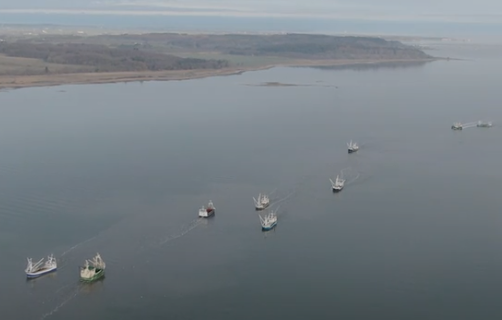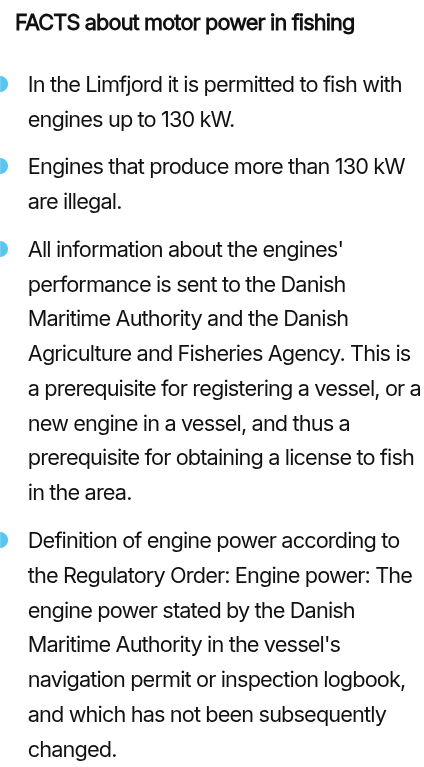|

Photo: Stockfile/FIS
Danish Mussel Fleet Under Scrutiny for Engine Power Violations
 DENMARK
DENMARK
Wednesday, March 19, 2025, 01:00 (GMT + 9)
The Danish Agriculture and Fisheries Agency has completed a comprehensive review of engine power compliance among 56 mussel and oyster vessels with active fishing permits, uncovering potential violations in 22 cases.
 Prompted by a highly critical report from Denmark’s National Audit Office (Folketinget Rigsrevisionen) in June 2024, the investigation scrutinized the accuracy of engine power declarations submitted by vessel owners. Findings suggest that nearly 40% of the reviewed vessels may have had engines installed or modified in violation of Denmark’s engine power regulations, particularly the 2004 prohibition on engine downgrading. Prompted by a highly critical report from Denmark’s National Audit Office (Folketinget Rigsrevisionen) in June 2024, the investigation scrutinized the accuracy of engine power declarations submitted by vessel owners. Findings suggest that nearly 40% of the reviewed vessels may have had engines installed or modified in violation of Denmark’s engine power regulations, particularly the 2004 prohibition on engine downgrading.
The Agency’s detailed inspections indicate that several vessels may have had their engines illegally adjusted to meet regulatory requirements or had power modifications that were undocumented. Authorities warned that violations could result in administrative or criminal proceedings, with vessel owners potentially facing significant costs if required to replace non-compliant engines.
Danish Fisheries Association Condemns Agency's Actions
 The Danish Fisheries Association (Danmarks Fiskeriforening) has strongly criticized the findings, arguing that fishermen have consistently followed official guidelines. Chairman Svend-Erik Andersen (pictures on the right) condemned the Agency’s shifting interpretation of its own rules, stating: The Danish Fisheries Association (Danmarks Fiskeriforening) has strongly criticized the findings, arguing that fishermen have consistently followed official guidelines. Chairman Svend-Erik Andersen (pictures on the right) condemned the Agency’s shifting interpretation of its own rules, stating:
“Our members have always complied with the Danish Agriculture and Fisheries Agency’s instructions. It is deeply frustrating that, following criticism from the National Audit Office, the Agency has changed its interpretation and is now threatening 22 fishermen with the possibility of replacing engines they purchased in good faith. This is unheard of in a constitutional state like Denmark.”

Danish trawlers working for mussels in Limfjorden
Andersen asserts that previous regulations allowed both manufacturers and local dealers to adjust engine power. However, the Agency’s revised interpretation now restricts this authority to original manufacturers, rendering numerous previously approved engine modifications retroactively illegal.
“You can’t buy an engine designed specifically for the Limfjord. That’s why power is determined at installation. Fishermen have followed the Agency’s published guidelines, which clearly stated that both manufacturers and dealers could adjust engine power. Accusing them now of non-compliance due to the Agency’s own mismanagement is completely unacceptable.”
 Legal Action and Calls for Real-Time Monitoring Legal Action and Calls for Real-Time Monitoring
The Fisheries Association has warned that it will take legal action if the Agency imposes penalties or mandates engine replacements.
“It is simply unjust for Limfjord fishermen to bear the consequences of a mismanaged regulation that authorities failed to administer correctly for years. We will thoroughly examine the legal basis of these actions and defend our members’ rights.”
As a long-term solution, the Association reiterated its call for real-time engine-performance monitoring, which it believes would provide transparency and prevent future disputes.
“For years, we have advocated for live monitoring of engine output. Our members have nothing to hide, and we fail to understand why authorities have not implemented such a simple, effective solution.”
The Agriculture and Fisheries Agency expects to conclude most of the 22 cases under review by mid-2025, after which further administrative or legal actions will be determined.
[email protected]
www.seafood.media
|



